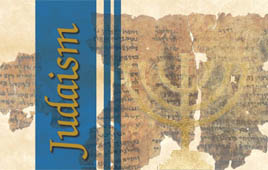Message from our President
A number of years ago, I taught a course in our Adult Education Academy called Intro-
duction to Judaism. I fondly recall how lively and well-attended these classes were, both by
members of our own congregation as well as by visitors from local churches.
During one discussion, I tried to convey the richness of Jewishness and the multiple
ways of living Jewishly. I remarked that religious observance is just one among many different
ways that we identify as Jews. To emphasize the point, I added that there are, and probably al-
ways have been, Jewish atheists. While the Jews in the room seemed perfectly comfortable with
this suggestion, the Christians sat and stared at me in silence and amazement.
How can you be both Jewish and an atheist, they asked with incredulity? I acknowl-
edged their concern by agreeing that the idea of a Christian atheist is self-contradictory. But the
notion of a Jewish atheist is not. How, then, do we explain the difference?
To be a Christian, one must embrace a particular religious doctrine about a Savior. To be
Jewish, in contrast, one need not accept any particular creed. Many of us feel Jewish in virtue of
our shared cultural heritage, our ethnicity, a particular understanding of history, or a sense of
allegiance to Israel. None of these modes of Jewishness requires commitment to a theological
idea. One can certainly be religiously observant to live as a Jew, but these other portals into
Jewish life need not involve prayer, ritual, or belief. There are many spokes leading into the
Jewish hub, each with its own meaning and validity.
In some cases, these different modes of Jewishness can be combined in rather creative ways.
It may surprise you to learn, for example, that there are Jewish atheists who regularly attend syna-
gogue and daven during Shabbat and holiday services. Some even put on tefillin. As one Jewish atheist recently explained to me, if you don’t do these things that doesn’t mean you’re an atheist. It means that you’re a goy.
In typical Jewish fashion, then, we can’t seem to agree on what it is that makes us Jewish, but
in some mysterious way, we simply are. Each of us may chart a separate course, but somehow, mirac-
ulously, we retain a distinct Jewish identify that endures throughout the ages.
Though I had coaxed at least some degree of comprehension from the Christian students on
this point, I could see that the depth, richness, and complexity of Jewishness still seemed to elude
them. This is what prompted one of them to ask if I could define Jewishness, or at least analyze and
distill it down to an essential description of some kind.
How was I to respond to such a request? Hesitantly, and not without trepidation mind you, I
suggested the following idea: Jewishness is a shared wisdom born of suffering. It is a wisdom consist-
ing of an intergenerational conversation that offers its own unique resistance to cynicism and despair,
a conversation that has stretched across many centuries and many continents, and shows no sign of
ending anytime soon.
Jewishness, I reiterated is not reducible to a creed or a formula, and what I just offered is not a
definition, I admit. Nevertheless, I do think these words express something essential about who we are
as a people.
When sharing this idea with an orthodox friend, he suggested that I may have missed some-
thing important. Jews, he reminded me, have traditionally waited and prayed for the Messiah, have we
not? This is a hope that is grounded in our scriptures, our holidays, our services, and our rituals. Wait-
ing and praying for the Messiah comes as close as anything we have to a theological doctrine.
I conceded the point, but still, I responded to his suggestion with a very simple question: what
happens to our Jewishness once the Messiah arrives? If waiting for the Messiah is the essence of being
Jewish, then after the Messiah finally comes the waiting is over and this essence becomes obsolete.
What then? Do we stop being Jewish?
My friend’s reply was that Ha Shem will decide this for us at the appropriate time. Yes, I sup-
pose that’s true. But if I were to have my way, I would prefer that even after the Messiah arrives, we
sustain our centuries-long conversation and continue debating what it means to be Jewish. That is the
wisdom I feel we’ve earned from our long history of suffering. And, that is the wisdom that keeps us
away from cynicism and despair. This is precisely why, when the Messiah finally does come, I’d be
very happy if he were to sit down and eat with us and join the conversation.
As the Talmud makes abundantly clear. To discuss, debate, and differ, even about our Jewish-
ness, is precisely what makes us Jews. Surely, the Messiah wouldn’t disagree with this now, would he?
Mark Packer, Ph.D.
President

